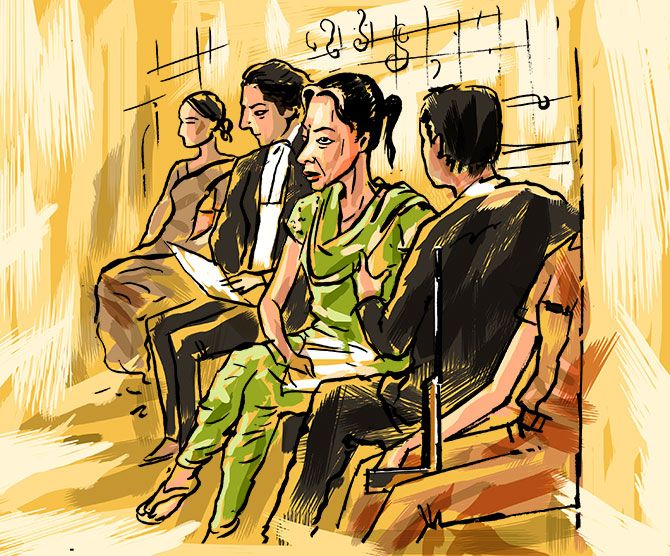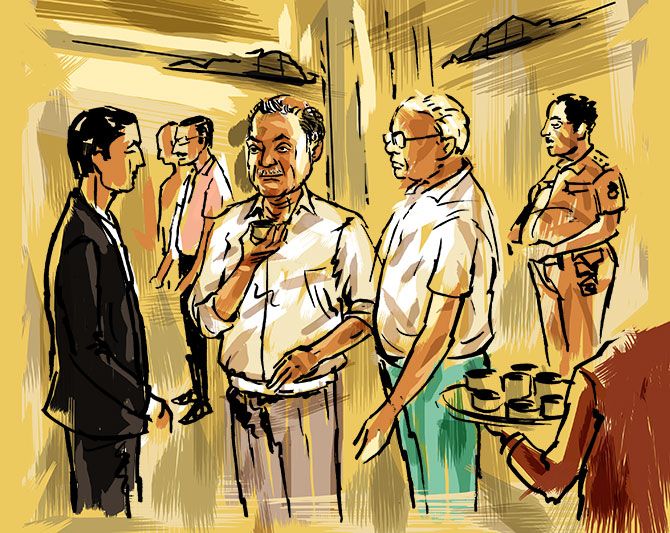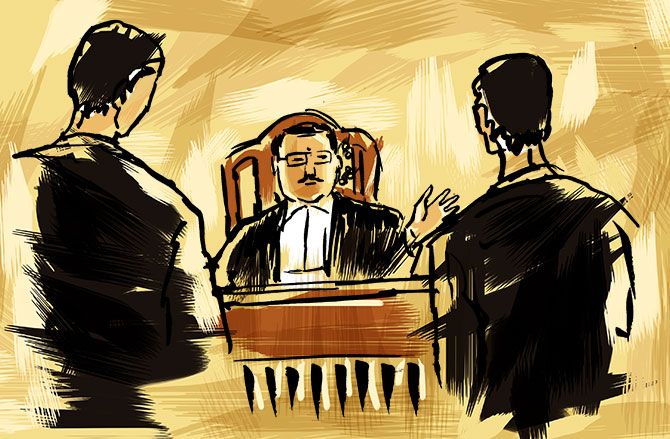'People wondered aloud why she had given up on the aging, getting-day-by-day-more-infirm avatar. And was freshly blooming.'
Rediff.com's Vaihayasi Pande Daniel reports from the Sheena Bora trial.
Illustrations: Dominic Xavier/Rediff.com

It was quite a different Indrani Mukerjea who appeared on the horizon on Friday, April 21, after alighting from the prison bus that brought her across town in 30 degrees Celsius heat, from the congested Byculla jail on Mirza Ghalib Road, central Mumbai.
As she sauntered towards the sessions court building, Kala Ghoda, south Mumbai, for her next court appearance in the Sheena Bora trial -- ahead of another woman prisoner tugging her two- or three-year-old daughter, who came with her -- you were looking at an Indrani who had, voila, shed 10 years in 31 short days.
Gone were the white locks that lent her the earlier mildly beatific look.
Her hair was trimmed, dyed a rich brown. Almost black. She was sporting a salmon shade of lipstick and wore an olive green chikan kurta.
Looking at this Indrani 2.0, you could imagine the Indrani of old, of her INX Media days.
That woman, again, both girlish and siren; a woman always aware of her charm as she skipped up the steps to the courtroom.
Indrani's elegantly dyed hair came up for discussion in the corridors of the court. Several times.
People wondered aloud why she had given up on the aging, getting-day-by-day-more-infirm avatar. And was freshly blooming.
It apparently bothered Bharat Badami, the CBI prosecutor in the case, who was at the court along with CBI officer K K Singh.
Badami brought it up after the half-minute hearing had concluded in Courtroom 51 -- co-accused Peter Mukerjea, Sanjeev Khanna and Indrani filed into the accused enclosure and reversed out in 30 seconds, as Khanna gallantly held the accused pen gate open for the New Indrani.
Conversation swirled around about how hair dye was not available in the prison shop.
How did she get the dye?
How did she get money to buy the dye?
Badami accused Indrani's harried lawyers of passing all kinds of mysterious things to her, including money, and vice versa. And threatened to raise the matter in court.
In now signature Badami playing-to-the-gallery manner, he turned towards the clutch of media reporters standing further away, and said loudly something to the effect: "I am worried about her security.
The connection between hair dye and her well-being was puzzling.

Peter and Sanjeev had already returned to the Arthur Road jail when Badami directed his concern about Indrani at the media.
Relatives and food/fruit dabbas made a thin showing on Friday, with only a friend of Peter's and brother Gautam showing up to warmly hug Peter.
Indrani had, for the first time, a visitor, a friend apparently, who sat next to her as she wrote copiously, in her neat, schoolgirl handwriting, using a red coloured pen.
Sanjeev, in a yellow bush shirt, had no one to see him, except a lawyer much later, and rifled through the court notices on the bulletin board, as he waited and paced around.
The noise of the altercation/argument between Badami and Indrani's lawyers over the alleged passage of money/dye!/goods caused Judge H S Mahajan to send a white uniformed peon out to ask them to clear out of the corridor and for Indrani to go back to jail.
The sound didn't match the hullaballoo happening below, at street level.
Out front OBV vans were gathering, thick and fast, along with more and more byte-starved television reporters.
Saharashri Subrata Roy -- the head of the beleaguered Sahara empire -- was expected any moment for a hearing in Courtroom 39.
Two Bengali 'media barons' in one court on one day, with media attention for the North Bihar-born older one in his shiny black waist coat and tie winning out.
Also in the courtyard downstairs, the police were having a serious and lengthy blow out with a bunch of rebellious young prisoners who were then summarily marched off to the prison bus.

As you cover the Sheena Bora trial, you learn there is much more happening in the stifling corridors of Mumbai's sessions court than in the courtrooms where hearings, at 15-day intervals, are a procession of postponements and adjournments.
Nearly three months into the Sheena Bora trial, the time spent in the courtroom has been all of 30 minutes approximately, between six appearances.
Since the trial began in early February, just one witness has made an appearance. An appearance that was aborted.
I learned I had at least five to seven years or more of coverage coming up when I asked a senior lawyer how long the trial would go on for; his estimate based on the length of other high-profile criminal trials.
The trial awaits an opinion from the Bombay high court on the suitability of admitting the testimony of the first witness -- Khar, northwest Mumbai, police station Constable Ganesh Dalvi who would testify about what the Mukerjeas' driver -- Shyamvar Rai, who has turned approver in the case -- told him after being arrested.
That opinion has been 45 days in coming and is yet not at hand as the CBI has sought more time in the high court.
Meanwhile, the accused continue to make appearances before Judge Mahajan of the CBI special court. Their next appearance is set for May 5.
Their last appearance was on March 31, a day when the sessions court was flooded unusually with women prisoners. That day Peter Mukerjea and Sanjeev Khanna showed up and spent a minute before Judge Mahajan.
Indrani did not appear in court on March 31; the judge said there was a shortage of women guards that day.
At that appearance, Peter was visited by his son Rabin and his girlfriend, his sister Shagun, brother Gautam and his sister-in-law Arti.
As Peter went through several helpings of pomegranate, mango, biscuits and sandwiches, one CBI officer muttered to the other in Hindi: "Peter is very interested in food." The other replied, with pronounced sarcasm, "He had become weak."
That day Sanjeev Khanna got a new pair of spectacles brought by cousin Nikhil, which he tried on repeatedly. And a plastic bag of new clothes and sandwiches.
Peter's family had brought Peter a plastic bag, probably clothes for the English classes he now conducts in jail, although he always wears, like a uniform, an austere white shirt and khaki trousers to court.
The police extra-meticulously went through these few new belongings, once upstairs, and again at the checkpost downstairs, shaking out each shirt, in the hope perhaps of something falling out. Nothing incriminating emerged.
May 5 may be another one minute appearance in court for this trio unless the high court opinion arrives by then.
Rumours surfaced around the corridors this Friday that that Friday in May could be a lively one, with some fresh charges aired even if the high court opinion does not come in.
EARLIER IN THE TRIAL...










